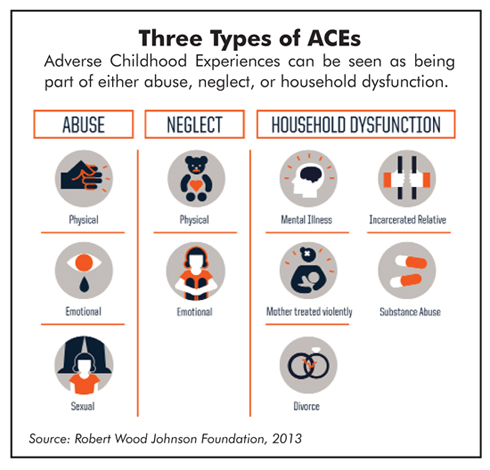 |
 |
 |
Vol.
22, No. 1
December 2016
Engaging "Familiar" Families by Considering Parent Trauma
So much of who we are as adults is shaped by what happened to us as children. For child welfare professionals this has profound implications for how we understand and work with parents. Especially when families are familiar to our agencies due to multiple incidents of child welfare involvement, engagement means seeking to understand parents' past experiences, as well as their present struggles.
"Familiar" Families and ACEs
Research tells us that families with repeat referrals to child protective services are more likely than other families to (CCPCW, 2006):
- Have parents with substance abuse, mental health, or domestic violence issues
- Be experiencing unemployment (and therefore poverty)
- Have young children or teenagers, and/or
- Have children with emotional disturbances or mental illness.
This won't surprise child welfare workers, but it's notable how many of these risk factors are reflected in, or easily correlated to, the ten Adverse Childhood Experiences, or ACEs, shown in the box below.

Traumatic childhood experiences are amazingly common in the general population. In a study of 17,000 middle class adults with Kaiser Permanente insurance, 26% of the subjects had one ACE, 16% had two, and 23% had three or more. This study and subsequent research has shown that as the number of ACEs a person has increases, so does their risk for negative health outcomes (CDC, 2016). Some of these problems--including depression, mental illness, and drug or alcohol abuse--are also risk factors for CPS involvement.
The point here is that like other parents you encounter in your work, parents in "familiar" families may be struggling with their own unresolved trauma histories, which may interfere with their coping, parenting, and ability to work with the child welfare system. Exploring this possibility may help you connect with and engage these individuals.
To be clear: it's still our job to ensure children are safe. Understanding what a parent is dealing with isn't a magic bullet and won't necessarily change what we must do. But it can change how we do it.
For ideas about what this might look like in practice, consider the suggestions below. For a deeper study of this topic, check out the National Child Traumatic Stress Network's free online course Working with Parents Involved in the Child Welfare System at http://learn.nctsn.org/enrol/index.php?id=452.
References for this and other articles in this issue
Suggestions for Trauma-Informed Practice with Families |
Child welfare professionals cannot undo parents' traumatic experiences, but they can:
Reprinted from Birth Parents with Trauma Histories and the Child Welfare System: A Guide for Child Welfare Staff. National Child Traumatic Stress Network, 2011. http://nctsn.org/sites/default/files/assets/pdfs/birth_parents_trauma_history_fact_sheet_final |
